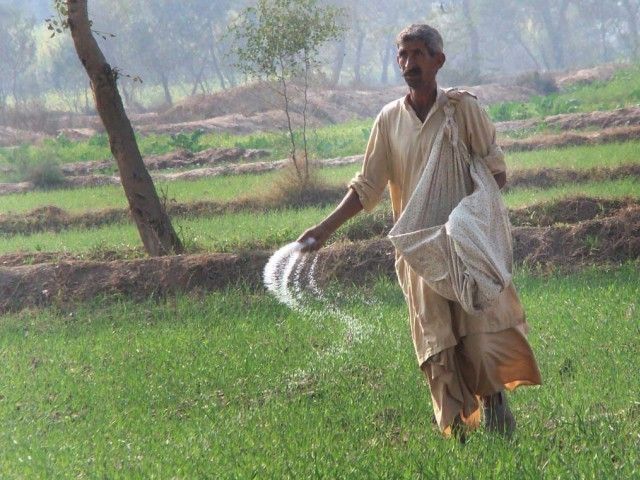
The Ministry of National Food Security and Research has raised doubt about the authenticity of data reported by the Pakistan Bureau of Statistics (PBS) that claims a decline in fertiliser prices.
It argued that the situation was not good as farmers were still facing shortage of fertiliser in the market.
In a meeting of the Fertiliser Review Committee held on December 24, 2021, the ministry’s additional secretary stated that although the price data reported by the PBS was showing a decrease, on the ground the situation was not good as there was a strong perception of urea shortage in the market.
He pointed out that people were standing in queues to receive urea fertiliser, which did not paint a good picture for the upcoming wheat crop.
The committee met under the chairmanship of minister of industries and production to review the availability and supply of fertiliser.
Punjab chief secretary, via video link, informed the meeting that currently there was gap between demand and supply of urea, but the demand was not based on actual requirement, rather the expected demand was augmented.
On the basis of daily dispatch data, district administrations were selling urea under their supervision, he said, adding that they would require daily supply of around 20,000 tons whereas they were being provided 13,000 to 14,000 tons.
He requested that supplies may be increased further so that the situation could be brought under control.
Punjab chief secretary also highlighted the slippage of fertiliser through the border districts of Punjab and Sindh. This fertiliser landed in Balochistan and from there onwards it was supplied to Afghanistan, which he said needed to be addressed as urea prices in Afghanistan stood at around Rs6,000 per bag.
Sindh agriculture secretary also highlighted that the province was facing acute dearth of urea due to alleged hoarding. He emphasised that supplies should be made better so that demand could be met.
Sindh director general (agri-extension) informed the committee that 97% plantation had been done, adding that fertiliser supplies needed to be increased so that next year’s wheat crop target could be achieved.
Minister of industries and production, at the conclusion of the meeting, stressed that based on the discussion the perception of shortage should be addressed collectively by the government and the industry.
Daily supplies by fertiliser companies needed to be further jacked up by 3,000 tons per day while Sui Northern Gas Pipelines Limited (SNGPL)-based plants should run at full capacity to meet demand for the Rabi sowing season 2021-22, he said.
The Petroleum Division should ensure the maintaining of gas pressure for fertiliser plants during the winter season, the meeting was told. A media campaign should also be launched by the companies, stating that all their units were operational and there was no shortage.
Additional secretary told the meeting that due to low gas pressure in December, it was likely that the cumulative urea production in the month would be around 560,000 tons against the estimate of 583,000 tons done by the National Fertiliser Development Centre (NFDC).
Furthermore, he said, if SNGPL-based and other plants continued to operate for the rest of Rabi months, ie February and March, then at the end of sowing season, the country would have a healthy urea inventory.
Urea prices, as reported by the PBS, had also come down since December 21, 2021, he pointed out.
Agritech CEO stated that the country was facing production shortfall of around 180,000 tons on account of closure of two SNGPL-based plants during summer months.
However, in the current international scenario for urea fertiliser, Pakistan has adequate installed capacity to meet demand depending on SNGPL-based plants being kept operational for the rest of the year, the CEO said.
FFC group general manager (marketing) informed the meeting that supplies were being managed as per demand and the company was doing its best to supply urea across the country.
Published in The Express Tribune, January 2nd, 2022.
Like Business on Facebook, follow @TribuneBiz on Twitter to stay informed and join in the conversation.





1719660634-1/BeFunky-collage-nicole-(1)1719660634-1-165x106.webp)












COMMENTS
Comments are moderated and generally will be posted if they are on-topic and not abusive.
For more information, please see our Comments FAQ